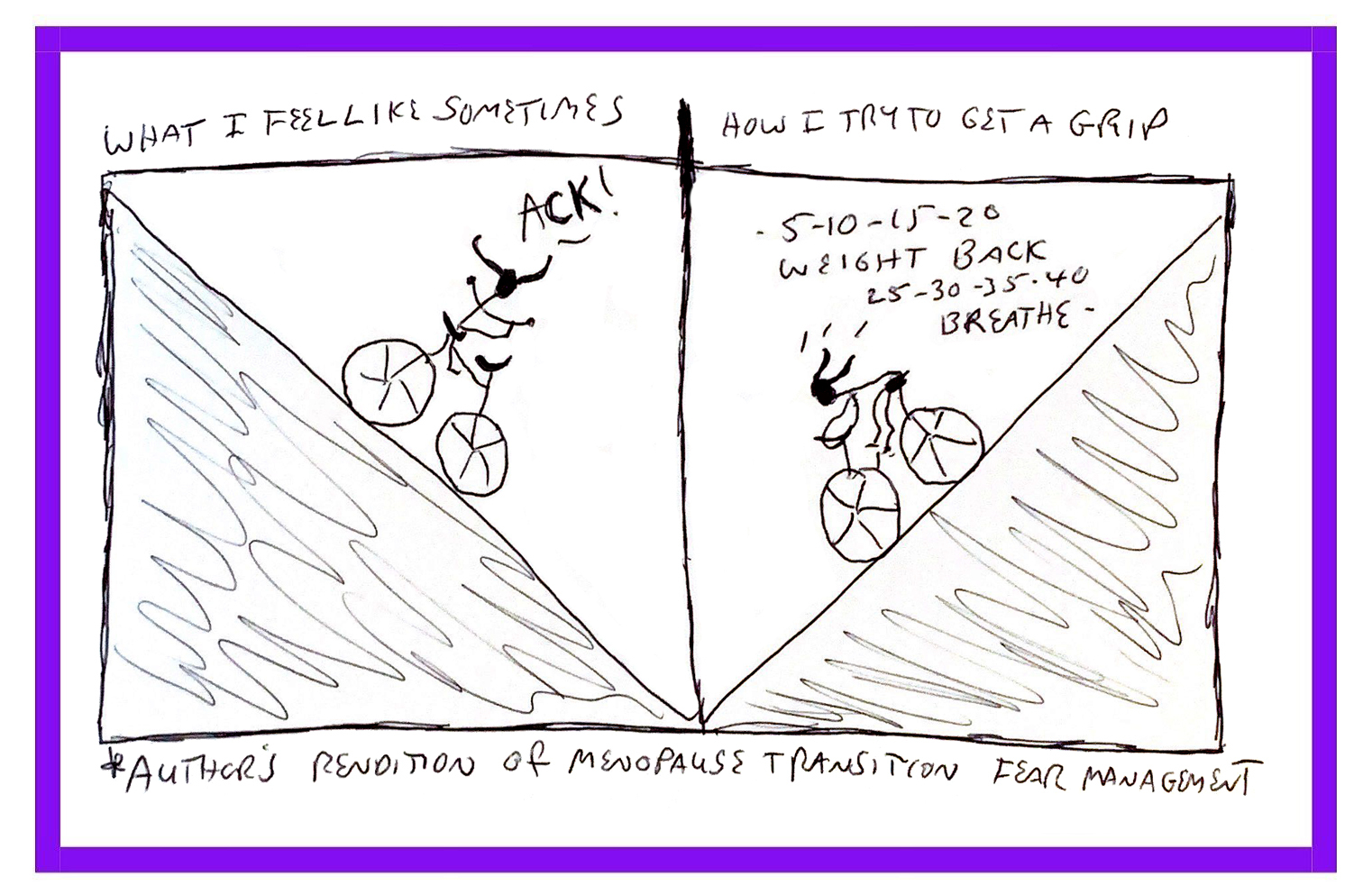
Is Menopause Making You More Anxious and Afraid?
Apr 25, 2022The fear factor during menopause is real. Here's what to do about it.
By Selene Yeager
“I mountain bike and am suddenly afraid to ride features I've ridden 1,000 times.”
“I’ve had full blown panic attacks in routine situations I’ve been in on the bike.”
“I climb and mountain bike and the fear is real…and random.”
One topic that comes up a lot in our social media channels is fear. Or more specifically, newfound, free-floating, random bouts of fear that pop up in circumstances where they've never been felt before. It's especially unsettling when you're on a group ride, skiing with friends, or out rock climbing with your usual crew.
It’s not your imagination. It’s your hormones. Rising anxiety is common during the menopause transition as your fluctuating hormones affect your brain chemistry and moods.
How Menopause Can Make You More Fearful
Your changing hormones, specifically estradiol (E2), the main estrogen hormone that you make during your reproductive years, also can increase your sense of fear. E2 is the form of estrogen that flatlines completely during menopause and is the main driver for many of the issues, such as increased risk of heart disease, women face post menopause. A study published last year in Biological Psychiatry: Cognitive Neuroscience and Neuroimaging shows it also may be the culprit behind this newfound fearfulness.
The study, which was designed to explore anxiety in women and why women suffer from anxiety disorders at twice the rate of men, found that there are sex differences in the way humans experience fear, but those differences are really grounded in estrogen status.
Women with lower levels of E2 expressed stronger levels of fear in experiments that paired images with loud bursts of noise. The researchers concluded that the outcome, “supports previous findings suggesting a protective role for E2 against fear over-expression during recall of fear.”
In other words, your brain is more likely to hang onto and summon those fearful feelings when your E2 levels are low. And when are they low? Menopause.
How to Deal With Menopausal Fear and Anxiety
On Episode 26 of Hit Play Not Pause, legendary climber Nancy Feagin, who has literally done it all: ice climbing, traditional climbing, sport climbing, bouldering, and mountaineering, including Summiting Everest in 2001 as the 11th American woman, opened up about her own journey with fear.
“The level of risk that I’m willing to accept has decreased since I was 40,” Feagin says. “I just manage it the best I can.”
Her go-to techniques include:
- Practice. Feagin will practice any given route dozens of times, breaking down and practicing key sections. Whether you schuss down powdery slopes or crush corners in cycling crits, working the fundamentals in non-pressurized situations can help your brain re-learn that it’s all going to be okay.
- Visualization. Feagin does a lot of visualization outside of her actual climbing. “I visualize the route, especially the parts where I am scared…It’s hugely helpful for me.” She visualizes how she’ll breathe through a hard part and how she’ll react if something goes wrong. Training your brain in this way helps it stay calmer when you’re faced with what frightens you.
- Grace. Despite all the visualization and practice in the world, there will be days when you’re just not feeling it, Feagin says. And that’s okay. “There are times when I go, ‘It’s a scared day.’ And I just try to be kind to myself.” Those are good days to just focus on doing other technique work or something that’s simply fun.
I don’t hang off sheer cliffs 2,000 feet in the air. But I relate to all of this. Sometime during the past two or three years, I’ve had similar panicky feelings while mountain biking routes I’ve done countless times.
When they pop up, I count — literally count, out loud — and talk myself through it in real time. It’s a tip I got from downhill mountain bike racer and world champion Leigh Donovan: When your thoughts are racing, start counting.
“One of the things that helps me keep calm and hold a rhythm on the bike is counting. I’ll just grab a number out of the air and start counting up or down,” she says. She gave me that advice 20 years ago, and I still use it, often just riffing by fives: 5, 10, 15, 20, and so on. If numbers aren’t your game, you can pick a favorite song refrain or a mantra to repeat.
When my mind really wants to freak out, I’ll blend counting with self talk (as shown below).

It doesn’t always work, of course. Overriding sweeping hormonal changes and maybe a growing self preservation instinct isn’t as easy as 1, 2, 3, obviously. But it helps me through minor episodes so I can keep on rolling. And when it doesn’t work, I give myself a pass to just walk it and live to ride another day.
Some reports find that hormone therapy also can help lower menopause-related anxiety and we've heard from members who are happily bombing down trails again after starting MHT. If your rising fear is overwhelming you, it's worth having a conversation with your doctor.
Get Feisty 40+ in Your Inbox
We hate SPAM. We will never sell your information, for any reason or send you emails that suck!

